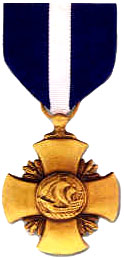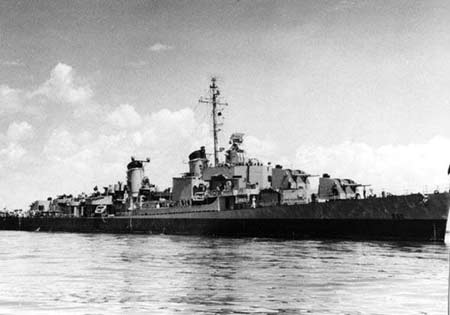
NAVY CROSS
UNITED STATES ATLANTIC FLEET
AIR FORCE
Mr. and Mrs. Joseph P. Kennedy
Hyannisport, Cape Cod
Massachusetts
|
Dear Mr. and Mrs. Kennedy: This is as difficult a letter as I will ever have to write, and as you know, it is not the first of it's kind. By now you will have been notified by the Navy Department that your son, Joe, has been killed in an aircraft accident while on an operational mission. The delay incident to your receipt of this letter is regrettable but it is necessary due to carrying out proper security restrictions. Joe's effects have been packed and inventoried and will be shipped to the Personal Effects Distribution Center, Naval Supply Depot for further shipment to New York in accordance with the instructions received from his sister, Lady Hartington. I am not at liberty to disclose the nature of Joe's mission but I can assure you that he gave his life while on a mission vital to the cause for which we are all fighting. As you must know, he volunteered for a special detail which was exceedingly dangerous. By thus volunteering Joe exhibited courage above and beyond the call of duty and contributed his fullest share toward the destruction of our enemy. Joe was highly regarded by all of us over here and was considered outstanding as an officer and man in every way, in his personal conduct and his devotion to duty. His clean cut, and intelligent way of life was an example to all of us which makes me confident that a nation composed of men like Joe will triumph over any obstacle. He will be missed by his shipmates and his loss will be felt by the Navy and his Country. Mass was said by Chaplain Callery after which we all rededicated our lives to carry on the fight relentlessly until we have won the struggle. Comment: This letter , endorsed by the United States Navy was notification of the death of Joseph P. Kennedy Jr., received by his parents. |
BIOGRAPHY
JOSEPH P. KENNEDY, JR.
His squadron, flying in the bitter winter over the Bay of Biscay,
suffered heavy casualties, and by the time Joe had completed his
designated number of missions in May, he had lost his former co-
pilot and a number of close friends.
Joe refused his proffered leave and persuaded his crew to remain on
for D-day. They flew frequently during June and July, and at the end
of July they were given another opportunity to go home. He felt it
unfair to ask his crew to stay longer, and they returned to the United
States. He remained, for he had heard of a new and special
Assignment for which volunteers had been requested which would
Require another month of the most dangerous type of flying.
…It may be felt, perhaps, that Joe should not have pushed his luck
so far and should have accepted his leave and come home. But two
facts must be borne in mind. First, at the time of his death, he had
completed probably more combat missions in heavy bombers than
any other pilot of his rank in the Navy and therefore was
preeminently qualified, and secondly, as he told a friend early in
August, he considered the odds at least fifty-fifty, and Joe never
asked for any better odds than that.
The Secret mission on which he lost his life was described by a fellow
officer after it was declassified:
Joe, regarded as an experienced Patrol Plane Commander, and a
fellow-officer, an expert in radio control projects, was to take a
"drone" Liberator bomber loaded with 21,170 pounds of high
explosives into the air and to stay with it until two "mother"planes
had achieved complete radio control over the "drone". They were
to bail out over England; the "drone', under the control of the
"mother" planes, was to proceed on the mission which was to
culminate in a crash-dive on the target, a V-2 rocket launching
site in Normandy. The airplane…. was in flight with routine
checking of the radio controls proceeding satisfactorily, when at
6:20 p.m. on August 12, 1944, two explosions blasted the "drone"
resulting in the death of its two pilots. No final conclusions as to
the cause of the explosions has ever been reached.
Joe was posthumously awarded the Navy Cross… and also the Air
Medal… In 1946 a destroyer, the USS Joseph P. Kennedy, Jr.
destroyer No. 850 was launched at the Fore River shipyards as the
Navy's final tribute to a gallant officer and his heroic devotion to
Duty.

U.S.S JOSEPH P. KENNEDY, JR. DD - 850
Comment: This Biography was published by "The Joseph P.
Kennedy, Jr. Foundation.
Story written by website manager Wayland Mayo.